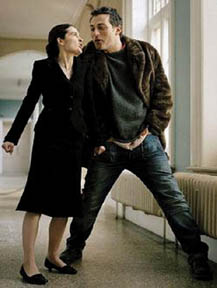|
observer |
|
|
|
|
|
OTHER LINKS |

|

|

|
Much ado about Shakespeare on BBC AmericaShakespeare was the king of incorporating other people's material into his own work. He got away with it because his plays consistently one-upped the originals. Most of us have never heard of, let alone read, Cinthio's Hecatommithi, but it's difficult to make it through high school English without being exposed to its successor, Othello.
Screen writers and playwrights have long followed Shakespeare's lead by recycling his plots, and some of these works achieve acclaim in their own right - West Side Story and Shakespeare in Love are both reworkings of Romeo and Juliet. But, more recently, purveyors of teen comedies have turned to Shakespeare for inspiration, usually with less than stellar results - witness 10 Things I Hate about You (The Taming of the Shrew set in a West Coast high school), O (Othello set in a Southern high school - noticing a trend here?), and She's the Man (Twelfth Night set in an elite prep school - luckily, the film's writers decided to nix the shipwreck scene). Now, the BBC, which has consistently churned out quality, faithful versions of Shakespeare's plays, has ventured into the realm of adaptation and placed four of them in a modern setting. Tagged ShakespeaRe-Told, the series premiered in Great Britain last year and will appear on BBC America on Sundays throughout August at 7 p.m. The series kicks off this Sunday with Much Ado About Nothing. Benedick (Damian Lewis) and Beatrice (Sarah Parish) have been transplanted from Messina to the set of a second-tier British broadcast news station. When the bickering between the former lovers - he ended things three years prior via a text message - threatens to destabilize the station's ability to broadcast stories about ladybug plagues and belly-dancing classes, their co-workers trick them into falling in love all over again. Lewis and Parish create the love/hate chemistry necessary to Benedick and Beatrice's relationship, but their soliloquys - a crucial part of the love-trick - feel forced when ripped from their original context. They also share a key romantic moment revolving around a Shakespeare sonnet, which predictably proves more awkward than romantic. Writer David Nicholls' updated subplot of Don John's attempt to prevent the marriage of Claudio and Hero, the play's other pair of lovers, is far more successful. In the original, Don John is motivated by politics. Here, Don (Derek Riddell) is a bona fide stalker, and his obsessive drive to destroy the couple adds a chilling element to an otherwise breezy comedy. Much Ado will be followed by Macbeth (Aug. 13), A Midsummer Night's Dream (Aug. 20), and The Taming of the Shrew (Aug. 27). Macbeth opens in the kitchen of star chef Duncan Docherty's (Vincent Regan) restaurant as Joe Macbeth (James McAvoy) - the star chef behind the star chef - deftly hacks into a pig's head. It's a sign of what's in store for Duncan. After a trio of prophetic sanitation workers predict that Joe - not Duncan's son Malcolm - will inherit the restaurant, he and his wife, Ella (Keeley Hawes), speed up the process by killing its owner. The high-stakes world of an elite restaurant is the perfect modern-day setting for Macbeth, and the script throws in a hefty commentary on ethnic profiling when Ella arranges for two Yugoslavian immigrants to take the fall for Duncan's murder. Its only misstep is its attempt to justify Ella's rationale - she lost a baby and she doesn't want Joe to suffer a similar loss. Shakespeare allows Lady Macbeth to gain a sense of humanity only when she finds herself unable to cope with the havoc she has created. Hinting at that humanity from the onset denies Ella the chance to be truly diabolical. A Midsummer Night's Dream is the series' weakest link. The quartet of young lovers' protestations - not to mention their behavior - are so pedantic that every moment the far more appealing supporting players are on-screen is a blessed relief. Dean Lennox Kelly plays an equally infantile but infinitely more amusing Puck. He nonchalantly tells Oberon (Lennie James) that he has tricked Titania (Sharon Small) into falling in love with "this donkey-man-comedian-type-thing" and views the magically befuddled young lovers as though he's the only person at a party who didn't eat the "special" brownies - "But they're funny when they're on love juice!" he protests after Oberon commands him to undo the damage he has inflicted upon them. Shakespeare's original play can be easily interpreted as preaching female subservience. This version preaches subservience on the part of both members of a relationship. It's a valid, if slightly odd, take on mutual respect. Shakespeare, it's not, but the BBC's productions certainly rise above their teeny-bopper-geared peers. (The Miami Herald) |









